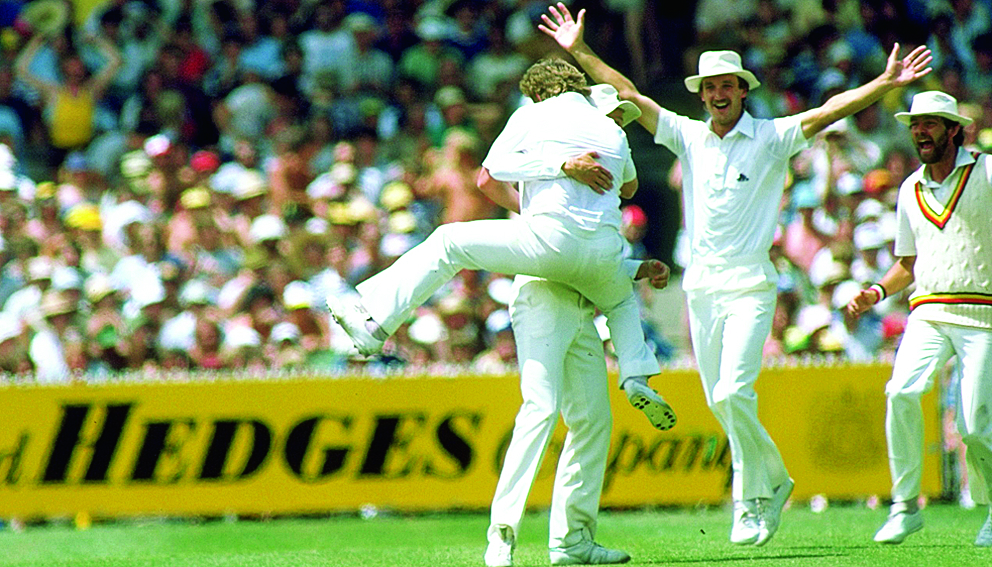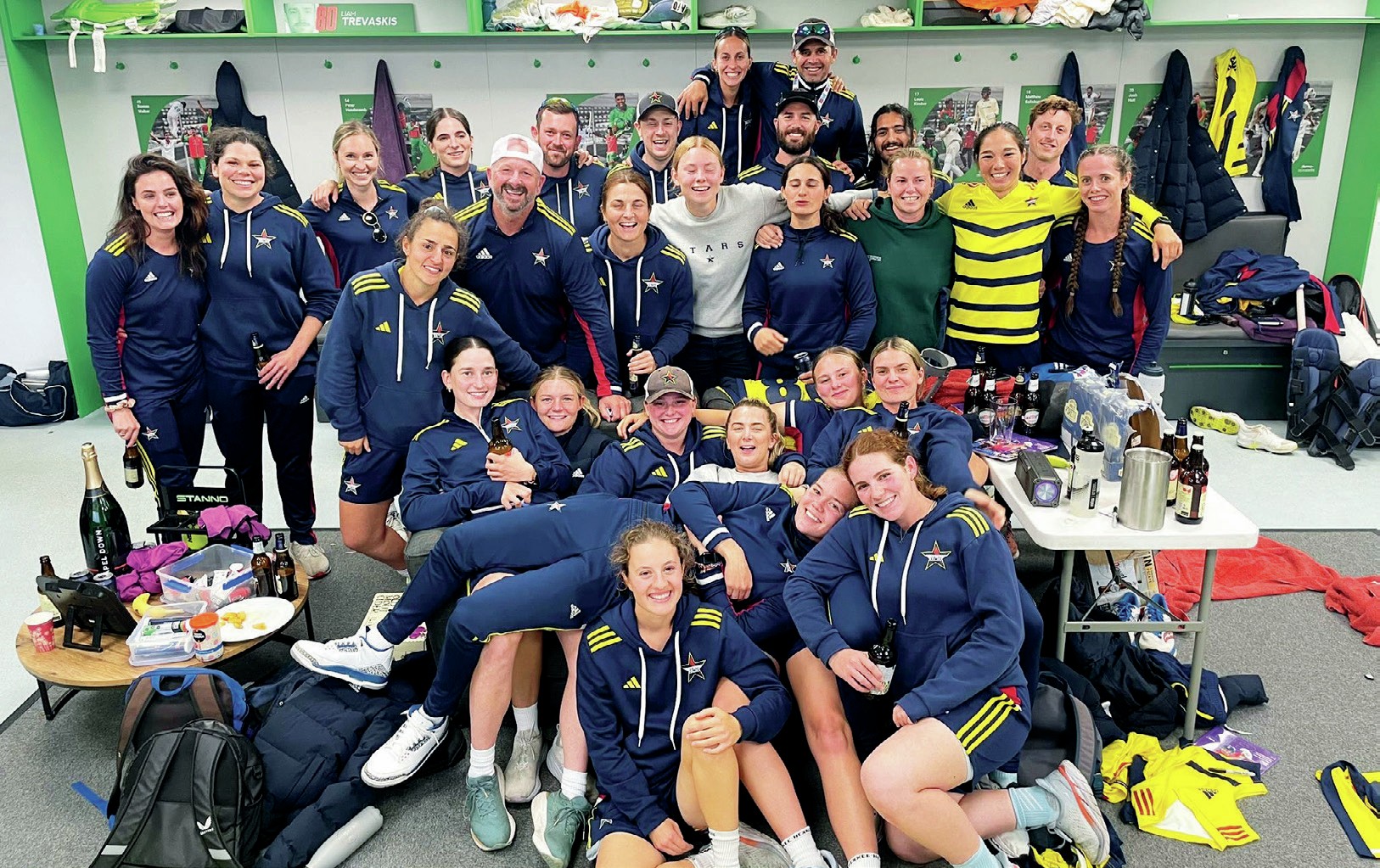
(Photo: Getty Images)
By Richard Edwards
Santa had finished dishing out his presents by the time England and Australia took to the field for the 1982 MCG Ashes Test – but it turned out he had one last gift to give.
After successive wins at the Gabba and the Adelaide Oval, Australia were already well in control of the five-match series. Greg Chappell’s side knew that a win or draw at the MCG for the fabled Boxing Day Test would see them wrestle back the Urn lost in dramatic style, largely thanks to the contributions of Ian Botham, in England the previous summer.
England, meanwhile, were desperate to salvage something from a tour that had promised so much initially, particularly after a hard-fought draw in the opening Test at the WACA but was now in danger of imploding.
England had arrived at the MCG fresh from a tour match in Tasmania. John Woodcock, The Times cricket correspondent, commented that he had “seldom watched cricket in a colder wind” – and the warmth felt for this England side after the 1981 Ashes was also in danger of cooling considerably.
There were, though, some positive signs for the tourists, with two young openers – Graeme Fowler and Geoff Cook – both scoring accomplished fifties that would secure them of their place at the top of the order for one of world cricket’s iconic Test matches.
The bowling, however, was a concern. Norman Cowans had been selected for the tour after making just 11 first-class appearances for his county, Middlesex. At a time of selectorial conservatism, picking the 21-year-old had been a sizeable shock. A single wicket in his first two Test matches appeared to suggest that it was hardly a gamble worth taking. The jury was out on whether he should keep his place in Melbourne.
“Having seen Frank Tyson, now one of Australia’s larger citizens, harness his raw strength in 1954-55, I will attempt some comparisons with Cowans,” wrote Woodcock. “Before coming to Australia, Tyson had played in 35 first-class matches for Northamptonshire, which included a full season’s cricket. Cowans had made only 11 spasmodic appearances for Middlesex before the present tour. Tyson was 24, broad-shouldered and aggressively confident: Cowans is 21, without such shoulders and in need of reassurance.”
Despite what had gone before, Cowans was about to serve dramatic notice of his talents – in one of the most thrilling Ashes Tests ever played.

Catch me if you can: Geoff Miller, bottom right, sprints off after taking the wicket of Jeff Thomson (photo: Adrian Murrell/Allsport)
Australia won the toss in front of a typically packed MCG post-Christmas crowd. Spirits were understandably high among the Aussie contingent – and tinny sales soared when both Cook and Fowler were sent back by twin tearaways Rodney Hogg and Jeff Thomson. The newly laid centre wicket at the cavernous ground was making life difficult for the batsmen – a theme that would recur as a fascinating Test unfolded.
Hardly the ideal start. If ever a man could quieten the hostile crowd, though, it was Chris Tavare, who saw off the new ball and began a one-batsman lesson in blunting a bowling attack. Silencing a gang of raucous Australians is never an easy task but if ever a man was designed for the role it was the Kent right-hander.
Thanks to Tavare’s 247-minute 89, and Allan Lamb’s more breezy 83 – scored from only 113 balls – England posted a first innings of 284. It was respectable rather than match-securing but as Bob Willis’s side readied themselves for an all-out assault on the Aussie top order, it soon became apparent that it was more than competitive.
The Aussies ultimately posted 287, putting them three ahead of the tourists and ensuring that the Ashes, as well as the Test itself, were well and truly alive.
Geoff Miller’s crucial 3-44, coupled with Willis’s miserly 3-38 ensured that England had given themselves a shot at Ashes redemption and when rookies Cook and Fowler took the visitors to 40-0, it looked as though England were finally going to get away from the Aussies.
But when Cook, Tavare and Gower fell before England had reached 50, the pendulum had again swung Australia’s way. Fowler’s gutsy 65 and similarly crucial contributions from Botham and Derek Pringle, eventually sent England on their way to a second innings total of 294 and a lead of 291.
On a wearing fourth innings pitch that would, most reasoned, be too much for the Aussies, despite their previous series dominance. Despite the predictions, this pulsating Test match had far more in store for supporters of both teams.
And after his early struggles, an unlikely hero was about to emerge from the England camp in the form of Cowans.
The Middlesex pace ace took two of the first three wickets to fall, including the prized-scalp of Chappell, caught by the substitute fielder, Ian Gould, for just two.
Kim Hughes, David Hookes and Allan Border then dug deep in an attempt to finally seal the Ashes. By the time the fifth wicket had fallen, the Urn was just 118 runs away.
In a see-saw Test, though, it came as no surprise when Cowans – who finished with figures of 6-77 – ripped through Australia’s middle and lower order to reduce the home side to 202-8. When the ninth wicket fell just 16 runs later, the match was England’s to lose.
A thrilling fourth day ended with Border and Thomson still at the crease – and just 37 runs away from victory. As the final day dawned, the gates of the MCG were thrown open, with the Aussie and English public able to enter the ground for free. That would have been a snip at the best of time but, in the finest tradition of England and Australia clashes, what lay in wait had most of them watching the action from behind their fingers.
As many as 18,000 poured into the ground, the Aussies scenting Ashes revenge for what had happened in England in 1981 and the English hoping for something approaching salvation and a final shot at drawing level in Sydney the following week.
As Thomson, showing commendable restraint, and the pugnacious Border honed in on their target, the former looked the more likely result. Only three runs came in the first 25 minutes but after frustrating the England attack, Willis’s options were becoming more limited by the minute.
After 85 minutes of play, Willis threw the ball to England’s talisman, Botham. At the other end stood Thomson, with 21 runs against his name. As Botham reached the crease the crowd sat silent, knowing that the Australians were now just a boundary from victory.
In the slips, a nervous cordon readied itself for any chance that might come its way. Botham’s first ball was short outside off stump and Thomson followed it. It caught the edge and flew to Tavare at second slip. In agonising fashion, he could only parry the ball. Fortunately for England it rebounded straight into the hands of Miller at first slip. The game was won, with just three runs separating the sides.
The atmosphere in the MCG suddenly popped like a balloon. The Aussies’ Ashes party was over. Or, in reality, merely postponed for a further week. The match itself, though, had assured itself a place in Ashes folklore.








